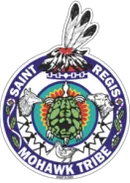AKWESASNE - On Kentenhkó:wa/November 9, 2022, the U.S. Supreme Court began hearing oral arguments in the Brackeen v. Haalland case that involves the constitutionality of the federal Indian Child Welfare Act (ICWA). The Saint Regis Mohawk Tribe joined an Amicus Brief in a show of unity and support for ICWA, which the Court is not expected to issue a decision on until Ohiarí:ha/June 2023.
Since its passage, ICWA has been a critical tool to address the historical injustices that have been perpetrated against Indigenous Peoples. It sought to reverse more than a century of termination-era policies that were designed to end tribal sovereignty. Through Indian Boarding Schools and other efforts, the U.S. Government’s goal was to disrupt the strong familial and cultural ties of Indigenous communities by erasing the identity of Native children.
Enacted by Congress in 1978, ICWA has served to address the high percentage of Native American children that were removed from their Native families and communities through child custody cases and adoptions. It gives tribal communities exclusive jurisdiction over court proceedings involving Native children who reside on reservations, while it provides concurrent jurisdiction for situations where a Native child resides away from tribal communities.
Today, ICWA continues to be an essential resource and much-needed source of support for Native children navigating their way through the traumatic and isolating child welfare process. It prioritizes the best interests of the Native child by serving as a “built-in” family component when a child feels alone. It allows tribal organizations to work in cooperation with outside, and often overextended, social service agencies.
With the backing of the federal law, the Saint Regis Mohawk Tribe’s ICWA Program has provided vital representation and supportive services to Native children. Since 1987, the tribal program has been involved with child welfare systems statewide and nationally in cases involving a Native child who was enrolled or eligible for tribal enrollment.
During the past five (5) years; the ICWA Program has received 2,124 notifications from outside courts seeking to establish a child’s identity. As of September 30, 2022; the tribal program has attended 963 court proceeding and has succeeded in maintaining the tribal connection of 95 Native children through family reunification, custody, kinship guardianship, or adoption.
To safeguard these efforts and to ensure that more Native children have the opportunity to regain and strengthen their tribal identify; on Kenténha/October 8, 2011 the Saint Regis Mohawk Tribe joined 180 tribal nations and 35 tribal organizations in submitting an Amicus Brief in support of Indian Child Welfare Act. The brief provided the Supreme Court with important context about the history and purpose of ICWA, and to highlight its continued vitality for Tribes.
With further hearings and deliberations to take place over the coming months; the voice of tribal nations, native organizations, U.S. States, child welfare and adoption organizations, and others is growing in a call for the Supreme Court to affirm ICWA. Until that time, we will continue to closely monitor the court case and will share any important developments.
#####
The Saint Regis Mohawk Tribal Council is the duly elected and federally recognized government of the Saint Regis Mohawk Tribe.

